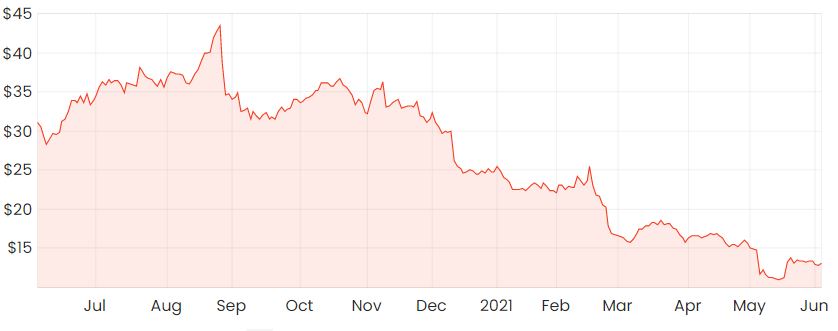The Appen Ltd (ASX: APX) share price has slumped another 6% today on news that one of its directors is selling down their holding.
Appen’s market valuation has fallen over 50% from the start of the year on the back of earnings downgrades and fears that its large customers aren’t as reliant on its services as they once were.
APX share price

Director sell-down
The ASX announcement this morning revealed that CEO and Managing Director, Mark Brayan has sold 109,430 shares, or just over $1.4 million worth.
The market was told that the sale was to satisfy tax obligations arising from the vesting performance rights earlier this year.
Despite the sale, Mark still holds 482,032 shares directly in the company and an additional 294,033 in performance rights.
“Tax obligations” seems a little opaque to be honest. While of course there are legitimate reasons for insider selling, it’s not a very good look, in this case, considering the negative outlook the market has had towards the company over the past nine months.
Strategy turnaround
Prior to today, the sentiment around Appen’s shares had definitely started building some positive momentum recently. This was mainly the result of an AGM presentation that laid out a restructuring plan based around four new business units, namely global, enterprise, China, and government.
In the past, Appen has utilised a project-based model that has exposed itself to the cyclical nature of its large customer capital expenditure (CAPEX). Revenue is therefore uncommitted and uncertain, which makes valuing Appen’s shares also quite challenging.
Additionally, Appen’s typically had a high revenue concentration from many of the largest US tech companies like Google, Facebook (NASDAQ: FB) and Microsoft Corporation (NASDAQ: MSFT).
The new strategy shift will see Appen move away from project-based work and start generating more revenue from customers on a committed basis. Due to the increased visibility around future earnings, it could be the case that investors assign a higher multiple to Appen’s shares.
Ideally, customer concentration will be reduced by branching out into the emerging markets previously mentioned. Its old relevance and speech business units will be consolidated to simply have global services and new markets.
For further clarity around future earnings, Appen will also start reporting its earnings in USD$ to remove some of the uncertainty around foreign exchange (FX) movements between the Australian dollar.
Does Appen’s valuation make sense?
While of course, it’s always easier to see in hindsight, it’s become clear that the market was assigning far too high a multiple for Appen’s shares given the slowdown in growth last year.
As you can see from the chart below, Appen’s shares reached a high of over 60 on a forward Price/Earnings (P/E explained) basis. So in other words, investors were willing to pay 60x more than the expected earnings per share (EPS explained) for the following year.

In Appen’s case, it was mainly investors willing to hand over more for its shares, rather than the share price growth being driven by fundamental metrics such as profit growth.
At the moment, Appen’s shares trade on a much more sensible forward P/E of around 25, which I think is fairly reasonable considering the average unit economics of a services business like Appen.
Although Appen is included with the other WAAX stocks, it’s important to remember that companies like WiseTech Global Ltd (ASX: WTC), Altium Limited
(ASX: ALU) and Xero Limited (ASX: XRO) are all software companies that have more attractive features such as higher gross margins and more recurring revenue.
They are most likely worthy of trading on a much higher “tech” multiple, but I don’t think it’s the case for Appen at the moment.
Summary
Appen’s new turnaround strategy seems promising and it’s definitely what the market wanted to see in terms of signs of recovery.
Of course, at this stage, it’s still a plan that management needs to execute on, so it might not necessarily mean that now is the time to buy shares.
Artificial intelligence (AI) still appears to be a structurally growing industry, which is one of the things we look out for as part of the Rask investment philosophy.
Management is estimating around $110 billion in AI spending by 2024, representing a 24% compound annual growth rate (CAGR).
To read more about Appen’s business model, click here to read: The potential bear case for Appen (ASX: APX) shares – Are they dirt cheap?
I’d also recommend signing up for a free Rask account and accessing our full stock reports. Click this link to join for free and access our analyst reports.










